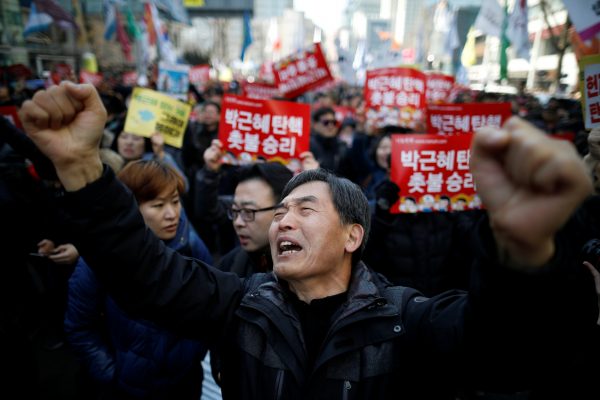The recent citizen-driven impeachment of Park Geun-hye is a clear indication that democracy in South Korea has outgrown the single-term limit. Although Park is the first president to be successfully impeached, she is not alone in ending a presidential term overwhelmed by corruption allegations.
Former president Roh Moo-hyun also faced an impeachment challenge and committed suicide shortly after his term ended. Park Geun-hye’s predecessor, Lee Myung-bak, spent much of his term embroiled in corruption scandals involving stock price manipulation, illicit land purchases, tax evasion and nepotism that resulted in the jailing of his elder brother, Lee Sang-deuk.
During Kim Dae-jung’s final year as president, all three of his sons were involved in a bribery and influence-peddling case. Kim was forced to apologise to the nation and resign from the Millennium Democratic Party that he founded. South Korea’s first civilian president under the current constitution, Kim Young-sam, ended his term in an approval ratings crisis in the wake of the 1997 financial crisis. His son was also imprisoned for bribery.
Reverting to a dictatorship is no longer a significant concern in South Korea, but future presidential corruption is inevitable under the current system. The fact that no president would have stood much chance in a theoretical re-election race points to an institutional problem in Korea’s idiosyncratic system. As the only developed democratic nation with a single-term limit, South Korea is an anomaly. This deviation from democratic institutional norms has created a structure that enables the worst aspects of Korean political culture to flourish.
South Korea’s ‘imperial presidency’ problem is widely recognised, and while its causes are diverse and complex, the proposed constitutional amendment will go some way to curb presidential corruption as it brings the crucial mechanism of re-election into play. In a single-term system, presidents enter a now or never period towards the end of their term in which political capital is traded in for personal enrichment, ideology or legacy projects. Without the possibility of re-election, accountability and transparency are not incentivised. The prospect of facing the public for re-election would not only discourage corruption but also encourage long-term policymaking and stronger communication with citizens.
Corruption in South Korea is tied to its own unique history and circumstances. But institutional reform to align with international norms cannot be rejected on the grounds of exceptionalism. There is strong support among citizens and politicians in the country for such reform and it has become a major issue in the current election race. While campaign pledges include a variety of suggested reforms, none get to the heart of the ‘imperial presidency’ problem the way that a change in term limits would.
While the proposed constitutional amendment seems conceptually simple, gathering the required political will across party lines has proven to be complicated. First seriously proposed by Roh Moo-hyun in 2007, it was also brought up by both of Roh’s successors, Lee Myung-bak and Park Geun-hye.
The failure of the last three presidents to push through the reform is not related to the proposal itself but rather with issues of timing and partisanship. As any move to a multi-term system would not apply to the sitting president, there cannot be any concerns of undemocratic motives. Instead, all three presidents have been accused of raising the issue of constitutional reform late in their term as a means to distract from other issues. It is therefore imperative that the next president prioritises constitutional reform early in the term.
It may be difficult for some to envisage anything other than a repeat of the pattern of corruption as a new South Korean president ends their term in five years’ time. But the opportunity to bring a fundamental improvement to the condition of democracy in South Korea should not be missed.
Kyle Pope is Lecturer at Yonsei University Foreign Language Institute.


Every nominally term-limited dictatator would love people to believe that the way to curb his power lust is to eliminate any curbs on his tenure. This article is full of non sequiturs. There is no evidence whatever that allowing a corrupt incumbent to serve longer will remove the incentives for corruption. This certainly has not proven to be true of multi-term strong men all over the world.